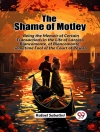In ‘An Habitation Enforced, ‘ Rudyard Kipling artfully navigates the themes of identity, belonging, and the intersection of civilization and wilderness. This compelling narrative unfolds as a reflection on the physical and emotional landscapes of human experience, depicting the protagonist’s internal journey as he confronts the challenges of re-establishing a home in the face of exile and cultural disruption. Kipling’s prose is distinctive for its vivid imagery and rhythmic cadence, echoing his background in poetry while engaging with Victorian literary traditions that often grappled with imperial anxieties and the nuances of colonial life. Rudyard Kipling, a luminary in British literature, drew upon his experiences growing up in India and later traveling through the British Empire. His immersion in diverse cultures and landscapes profoundly influenced his writing, infusing his stories with authenticity and depth. Kipling’s dual heritage—of British origin yet deeply connected to Indian culture—often placed him at the crossroads of conflicting narratives, a theme that resonates powerfully throughout this work, revealing his keen insights into the human condition and the tensions of place. ‘An Habitation Enforced’ merits a close reading for those intrigued by the complexities of displacement and belonging. It invites readers to reflect on their own notions of home, urging a deeper understanding of the environments that shape our identities. Kipling’s mastery of language combined with his rich thematic explorations makes this book a must-read for anyone interested in the enduring questions of culture and existence.
Over de auteur
Rudyard Kipling (1865–1936) was a prolific English writer and poet, renowned for his works of fiction, poetry, and his deep engagement with the themes of imperialism, adventure, and English identity. Born in British India, he was sent to England for education and later returned to India to work in journalism. Kipling’s storytelling captured the complexities of the British Empire and the diverse cultures within it. His writing is characterized by a mastery of language and a blend of realism with elements of the fantastic. Among Kipling’s most famous works are ‘The Jungle Book’ (1894), ‘Kim’ (1901), and ‘Just So Stories’ (1902). The story ‘An Habitation Enforced’ showcases Kipling’s nuanced understanding of English societal norms, explored through the experiences of an American couple integrating into English rural life. Kipling’s work earned him the Nobel Prize in Literature in 1907, making him the first English-language author to receive the award. His literary style often reflects his support for the British imperial order, yet also reveals a deep empathy for individuals, particularly those on the fringes of society. His contributions to literature have cemented his legacy as a storyteller of significant cultural and historical influence.












